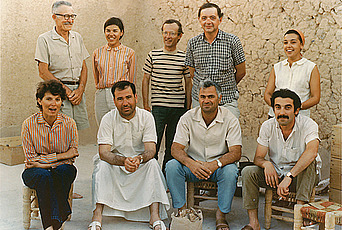Studying the Qurʾān in Cultural Terms

Western Biblical scholarship has existed as a historical enterprise independent from church and synagogue as far back as the eighteenth century. Western study of the Qurʾān, however, has more recent roots, with interest taking hold in the early nineteenth century.
“Western Qurʾānic studies started with a striking non-synchronicity with both Biblical studies, which it only superficially resembled, and Muslim Qurʾānic studies, which, from the outset, it excluded from its scope,” says Angelika Neuwirth, the Agnes Gund and Daniel Shapiro Member in the School of Historical Studies last spring. “In the second half of the nineteenth century, reformed thinkers put forward new approaches that shared important ideas with Western Biblical scholarship. Those approaches were, however, sidelined and have remained detached from Western developments.”
These disjointed approaches, along with limited access to Islamic texts, have impeded the study of the Qurʾān, which Patricia Crone, Andrew W. Mellon Professor in the School, describes as “an extremely enigmatic and elusive document. We can’t claim to have a very good understanding of what is going on in it, what it is referring to, who the people are that it is addressing, or what the relationship between them is.”
Crone, whose research is focused on the Near East from late antiquity to the coming of the Mongols, works on the cultural and religious traditions of Iraq, Iran, and the formerly Iranian part of Central Asia, and also on the Qurʾān. Each year, she brings a group of leading Islamicists to the Institute to exchange ideas and share research. A Qurʾān colloquium and associated lecture, supported by the Dr. S. T. Lee Fund for Historical Studies, were held at the Institute in June. Among the participants was Neuwirth, Professor at the Freie Universität Berlin, who is currently overseeing a major research project in Berlin using, among other things, archival photos of ancient manuscripts of the Qurʾān long thought to have been destroyed during World War II. Neuwirth and her collaborators are working to develop a new understanding of the Qurʾān in cultural terms with the eventual aim of producing a critical edition of the Qurʾān that will include documentation of its text, commentary on its content, and a collection of materials on recent literature.
In association with the colloquium, Neuwirth gave a lecture, “The ‘Late Antique Qur’an’: Jewish-Christian Liturgy, Hellenic Rhetoric, and Arabic Language,” in which she discussed how, before it was recognized as Muslim scripture, the Qurʾān was communicated to an audience whose education was based on late-antique traditions—Judeo-Christian, Hellenic, and Arabian. According to Neuwirth, despite the highly political notion that the Qurʾān is a text fundamentally alien to European culture, it is rooted in the same geographical area and is in the same line of tradition of other writings that have been assimilated as founding documents of European identity, most prominently Biblical and post-Biblical literatures.
“We have, in my view, to face a long-neglected political dimension of our work,” says Neuwirth. “Qurʾānic studies today can no longer be confined to textual or historical analysis. Scholars in the field, like it or not, have become interlocutors in a political discourse involving Western, Eastern, and Near-Eastern intellectuals. It is a discourse that I would identify as the quest for a new and more comprehensive Western/Eastern cultural identity.”

